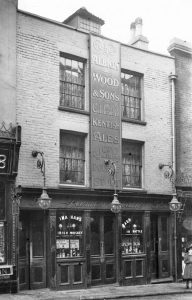I am excited to be writing my current book, the intriguing life story of my immigrant ancestor, Job Tyler. This narrative biography describes his life story in present tense, as if you are there with him. Here are the first two pages to illustrate how historical fact is blended with “could have happened’s.” I’d be pleased to receive comments on this approach to writing.
(Note: I’ve added notes on this posting to indicate some of the historical basis for the story line. In the final manuscript, they will be footnotes.)
First night in Gravesend
Job Tyler hesitantly entered through the doorway of Albion Tavern, a recently built portside tavern in the town of Gravesend. The rainy summer evening’s air outside had been stifling but the tavern’s interior was hotter still, thick with the smells of men, beasts, and stewing onions. A lean mongrel dog padded in behind him, shaking itself and trotting off under one of the long trestle tables in search of scraps.
Job paused, his hand still on the rough-hewn door, his eyes adjusting to the dimness. Mariners laughed boisterously near a diminishing fire, their cloaks steaming where they had hung them to dry. Merchants huddled over dice games, the clink of coins punctuating their curses. A maid brushed past him, balancing two jugs of ale with practiced grace.
Not comfortable being amongst a rowdy crowd, Job decided to sit at a small table in a corner, away from the noise, where he ordered a tankard of Kentish ale. When it arrived, his fingers curled around the cool pewter, more for comfort than for thirst. He had barely taken his first sip when a young man about his age approached and gestured to the empty bench.
“May I take this seat?”
Job nodded, grateful for the company.
“I am Thomas Grigg,” the boy said, settling on the bench across from him. “Suffolk born. On the morrow I take passage on the Globe, which is bound for Boston.” (Note: Job and Thomas’s names were on the manifest for this ship.)
Job’s heart quickened. “I am booked upon her as well,” he said, surprised by the sudden relief that flooded him. “My papers send me to Virginia as an indentured servant, though I know not to what place.”
Thomas grinned, as though the unknown was an adventure rather than a worry. “Then we will be shipmates. Better so than to face the crossing alone.”
As the evening stretched on, Thomas spoke freely, describing what he had learned about the journey—what to bring, how to avoid seasickness, the rough ways of sailors. Job listened closely, his world expanding with each new detail. When Job asked about Gravesend and its name, Thomas leaned closer, lowering his voice like a storyteller by a hearth.
“They call it Gravesend with good cause,” he said. “Tis said that in the days of the Black Death, the dead were sent down from London to be buried here. Think on that as you lie awake tonight.” (Note: This town is still located on the Thames River.)
Then Thomas laughed softly. “England hath many towns with strange names—Crapstone; Great Snoring; Brokenwind. We love to make sport of ourselves.”
Gravesend’s interesting history was coupled with its current importance as the port situate at the mouth of the Thames River, located twenty-one miles east of central London (and thirty miles north of Job Tyler’s home in Staplehurst, County Kent). With a favorable climate and protected from storms by Windmill Hill, the location gave ships ready access to the English Channel and the Atlantic Ocean. Thus it was favored as the port of setting-forth by the master captains of many emigrant merchant ships.
As darkness fell outside, Albion Tavern’s oil lamps and tallow candles were lit for extra illumination, leaving dark, dancing shadows in the corners of the room. Job and Thomas talked further. Thomas took another ale while Job nursed his first tankard to save the little money he had with him for the trip. Job asked Thomas if he knew anything about the Globe’s captain.
“Master Captain Jeremy Blackman,” Thomas said, and his tone grew serious. “He has crossed the Atlantic many times, but he is a hard man.”
Thomas told the story of a boy onboard a Blackman ship who innocently lost a bottle of “strong water.” Blackman showed no patience and “whipt him with the tags of points bent and whipcord and forced him to confess, even though he manifested his innocence. The Master caused him to be drawn up with ropes and hung up by the wrists with a murderer or mortar piece of 2 cwt. made fast to his legs, there hanging in most miserable torment upon the rack till the passengers crying out shame on him cut petitioner down.” (Note: an actual quote)
Job winced. “And this is the man who will take us across the sea?”
Thomas nodded solemnly. “Aye. Best to keep out of his way,”
When the tavern finally began to quiet, Job and Thomas decided to call it a night and take leave of the tavern. Each made his way to the room he had let nearby. That night, Job lay awake long after the tavern’s last lamp was extinguished. He recognized this may be the last bed he would sleep in for weeks. (Note: The Albion Tavern building, built in the 1630s, still exists.)
Albion Tavern, circa 1900





